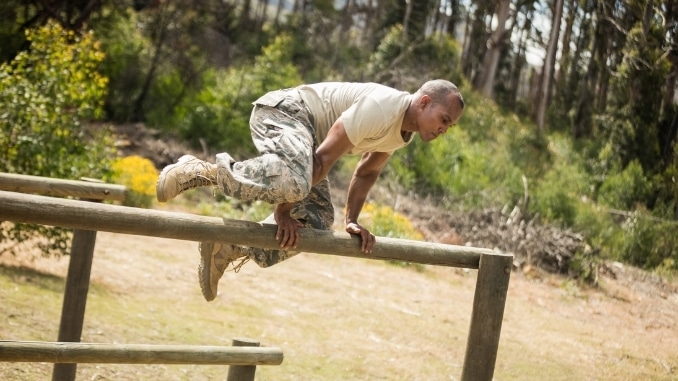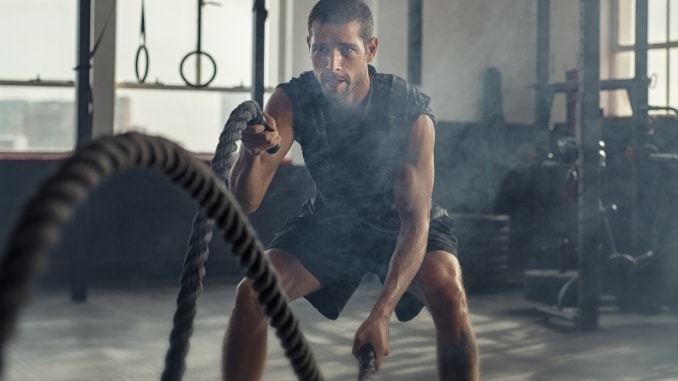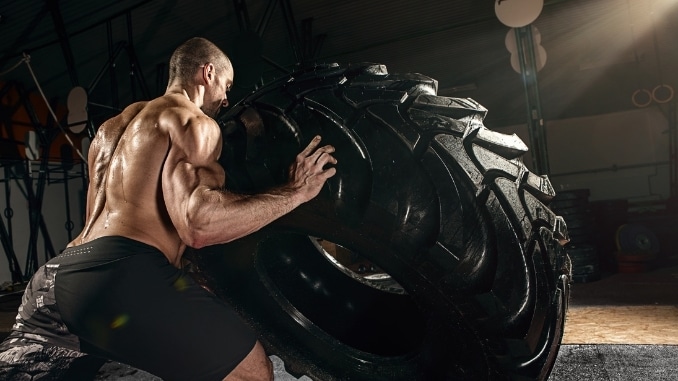
Today, I have another interview for you with the one and only Mike Gillette. He is an amazing guy. In the interview below, he talks about how to be physically tough by cultivating mental toughness.
I hope you are having a great day.
Enjoy!
~ Rick Kaselj
CLICK HERE to watch the YouTube video interview.
In the interview above, you will discover:
- Who is Mike Gillette?
- What prompted his interest in strength training?
- What led him to seek and bring off superior physical and mental toughness?
- How to be physically tough by cultivating mental toughness.
I hope you enjoyed the interview.
Take care!
Rick Kaselj, MS
If you are unable to watch or listen to the above interview, Check out the transcript below.
Rick: Hey! This is Rick Kaselj from ExercisesForInjuries.com. Today, I have another interview for you and it’s with Mike Gillette. And I’ll get Mike to introduce himself and then we’ll get into the interview.
Mike: Okay. Thanks, Rick. Awesome to be with you and to have a chance to talk to your listeners. I think I would best be described as a perpetual strength seeker. It’s something that’s been with me as I’ve kind of evolved through different career fields in my life, different periods of my life. It’s just kind of been the constant in the background, trying to find ways to improve myself physically and mentally. Cultivating mental toughness has been a significant part of that journey.
Rick: Awesome. Now, looking at the strength side of things, what prompted you to get into strength training? [¹]
What prompted Mike Gillette to get into strength training?
Mike: Well, strength was something for me when I was very young I was a -physical person, probably an extreme example of that. So it was always something, being strong, being capable waw something that seemed kind of exotic and mysterious to me when I was a young person. And then when I decided to pursue being a physical person, this was 19 or so years old and I was looking at joining the military, I knew that it would be sort of a vocational imperative to become a physical person even though at the time I really didn’t know quite yet what that would entail or what that meant. I knew that it was coming and I knew that I would have to start preparing myself in some fashion. Cultivating mental toughness was also crucial during this time.
How did Mike Gillette start?
Mike: So with a rudimentary approach I began doing a lot of calisthenics, I started running because I had seen movies of guys in the army and they seem to run a lot, they seem to do a lot of push-ups so I thought well why not do some of that.
Once I was actually in basic training, once I was on active duty, things became a lot more sophisticated in terms of how I was trying to accomplish things. I basically wanted to be the best soldier that I could so that did still mean a lot of running.
Mike: I was at Fort Bragg’s 82nd Airborne Division. I also swam quite a bit in those days and I also lifted weights but that was in using the Nautilus System, using the old Arthur Jones Nautilus machines, and the classic Nautilus gym set up. So you had to go in the order prescribed, you could only do the Arthur Jones protocol of like one set per machine and if the guy who was running the gym saw you deviating from that you would be banned from the Nautilus machine. Cultivating mental toughness was also a key aspect of my training during this time, as it helped me stay disciplined and focused on my goals despite the rigid structure.

Rick: Oh my gosh. (laughing)
What are Mike’s perceptions about exercise machines?
Mike: Arthur Jones had done a very good job of creating this sense that if you use these exercise machines wrong, something mysterious and dangerous might happen to you. So that was pretty good marketing. I thought the machines were cool for cultivating mental toughness. They were still considered relatively exotic at that time for actors so for me it was a question of wanting to do well in my chosen job at the time and also it was a very competitive environment.
Mike: Fort Bragg North Carolina is home to the 82nd Airborne Division Special Forces Training. It was also home base to the 7th Special Forces Group. So the vibe at Fort Bragg was very intense and I was young and I was absolutely in it, loved it, and wanted to do whatever I could to be a competitive guy in that universe, to be a legit paratrooper.
Rick: Cool. That kind of led you into the strength side of things. Now, you’ve taken that to a new level, so what led to you focusing on the superior physical strength and the superior mental toughness and trying the things that most people wouldn’t try like bending rebar on their heads?
What led Mike Gillette to focus on superior physical strength and mental toughness?
Mike: My proclivities only seemed sort of extreme realism in the few years really, maybe I think since 2008 when I started doing some of the things that you were alluding to. But really the foundational mentality was there going back to that military time. Military time is where I learned that I could be physically tough by cultivating mental toughness. And I didn’t really have a sophisticated process for doing that at the time. All I knew to do was to keep going, to push myself further. I mean, I was doing okay when I got to Fort Bragg. I was getting perfect scores on my PT tasks at the time but in Fort Bragg that wasn’t considered a big deal, that was kind of expected.
Mike: So I immediately had to adjust to wow, these guys’ mental toughness is kind of next level. So I just pushed myself really hard. And then it was shortly after I left active duty, I was intending to continue on active duty after college but I came to the end of my enlistment, and qualified for an ROTC scholarship. My intention at the time was to go to college, get my degree, and go back on active duty as an officer. Basically, that’s how you make the transition from being a fry cook to an assistant manager. You’re trying to make that supervisory leap. So my first semester at college, the University of Arizona in 1984, I was in a climbing accident and got all smashed up, so much so. So I broke my back, and my ankles and was medically processed out of the military.
How was Mike Gillette affected by the incident?
Mike: There was no possible way at that time that my orthopedic surgeon said I could ever reasonably consider pursuing that kind of stuff. I would never run again, never jump out of airplanes, and so on. My mental toughness really, whatever it was that I was doing to have it, to make it real for myself, was really called upon in those years. Because it was about 4 ½ years of going from a guy who was navigating in a wheelchair to a walker to those crutches that wrap around your arms because I was in this huge brace for my back.
Mike: I’m trying to navigate around campus and figure out what I will do with my life. I was married, and we had a baby at the time. All I knew was that I didn’t want to be anything other than the kind of person I had forged myself into or started to forge myself into when I was in the military. So I kept trying to chase that even though it hurt a lot. There were many setbacks and frustrations. So the mental toughness was a long evolutionary process for me but wasn’t a formalized process.
Mike: It was just something I did, and I think that most people who we look at say, “Oh, that girl. She’s mentally tough. That guy, he’s mentally tough”, are people who don’t necessarily have a system in place. They somehow make themselves do it.
What made Mike Gillette enter the navy?
Mike: They can somehow push through all kinds of things, and that’s one way to do it. I would refer to that as sort of the experiential model. You align yourself with a guy who used to be a Navy SEAL because you want to become mentally tough. It’s like he ostensibly was, but the only thing he knows how to do is duplicate that experience. So that’s not necessarily going to work for everybody. We don’t have the luxury of time or the wear and tear of mimicking certain things if you survive them, congratulations.
Mike: I suppose you’re mentally tough now. There are other ways of doing it. I was going for it before I went into the army that was just to get money for college. And so fast forward, I’m eventually physically better to the point where I can reasonably consider pursuing law enforcement.

How the navy helped Mike Gillette to practice physical and mental toughness?
Mike: So I was physical again. I got myself over many hurdles, and all of that was great, but as I entered that particular profession, Rick, I found myself getting involved in training quite a bit right away. I’m now the pretty young cop to get plugged into some of the training assignments, but what I found was in the spectrum of skills that law enforcement personnel trained in, whether it’s using their expandable batons or the pepper spray, so much of the way that those particular tools were taught kind of sterile.
Mike: It was in a classroom, vacuum sort of context because it’s easy to manage training in that fashion. It’s easy to make training safe in that fashion, but those conditions did not replicate the world where police officers have to function. Police officers sometimes get jammed up and either under-respond in certain circumstances or over-respond in certain circumstances because their training never really puts them in situations that could replicate the stress and the confusion of the darkness, the fatigue, and all of these different variables.
What did Mike Gillette insert in his training?
Mike: So once I has that realization, I started looking for all kinds of ways to insert those variables into the training that I was doing for others and of course my own training. So that was really when I started to look at kind of the behavioral science variable of even physical task training. So that can be applied to physical training. I mean, look at what people are doing now with some of these obstacle races, that’s kind of interesting.
Mike: I mean, it’s fun and it’s recreational but at the same time you’re taking physical tasks and you’re putting them into an environmental context or a long durational context. So yes, I can jump over hurdles or I can climb over this or that but can I do that after I’ve run three miles and I’ve just fireman-carried three different guys and we’ve crawled to the mud and I think I drank some of that water and I get a stomach ache, all of these kinds of problems.
How did Mike Gillette make himself better?
Mike: And for me, it was the sort of ongoing search for how do I make things more challenging, how do I make myself better, how do I make other people better, and really looking at different ways, different techniques. So I had a lot of time I spent in martial arts and some of that to be gleaned from the martial arts. There were things that I was learning because I was studying skills like hypnosis or neurolinguistic programming really because I was trying to see if there were things there that might be applicable to the people that I was training.
Mike: And the intent to sort of create the most idealized version of myself because if I figured if I knew how to crack that code then I could take that and apply it to other people. Because like all through the 90s and the early 2000s I was training hundreds and then thousands of different people, mostly in high-risk professions
How did Mike Gillette make the best Mike Gillette?
Mike: After the events of 911, I was training a lot of people who were learning new skills simply because of the jobs they had. So I worked extensively in the airline industry. I worked with people in the hospitality industry, theme parks, and so forth. What we might refer to as targets. There were the technical skills components associated with all of those audiences. But moreover, there was the sort of behavioral filter that all of that information would have to be processed through in order for you to bring those skills to bear in real-time, in the real world.
Mike: So it was a long time coming. This kind of pursuit of, “How do I make the best Mike Gillette?” so that once I’ve learned how to do that I can make the best everyone else that I come into contact with in my role as an instructor. And that ultimately takes us to the last part of your question which was when I started doing things that look a little bit extreme.

What did Mike Gillette learn in his fact-finding field trip?
Mike: In 2008 I went on a sort of fact-finding field trip. It’s a multi-day workshop that a gentleman named Dennis Rogers was putting on. Dennis Rogers is probably the best-known of the performing Strongmen. This is a gentleman who’s been on Oprah, Letterman, Regis, and Kathie Lee. He’s done TV, he’s traveled the world and he was the first human to fold a crescent wrench in half. I believe he was the first person to S-bend the crescent wrench which means in thirds. But the thing that was most compelling to me about Dennis is he was older than me. He was even a little bit smaller than me.
Mike: I’m an average-sized guy, 5’9”, 180 something depending on what day of the week it is. However, Dennis was even a little bit smaller and he was doing stuff that was just off-the-charts difficult. And what I wanted to know is how a guy could do what he did and not have his body disintegrate under the unique stresses that had to be present while doing those things. So we talked.
Mike: He invited me to this workshop because he had some other students from all over the US. He also had even internationally. So I was going there to get in their face and say, “How on earth do you do what you do?”. It’s because all of these guys had some unique specialties. All of which was just mind-boggling to me. I never had any inkling that I might one day be able to hang with those guys as somebody who could do some of those same things, too. It just seemed way beyond. Cultivating mental toughness was a key factor in even considering the possibility of attempting such feats.
What did Mike Gillette do to stay healthy?
Mike: I mean, I’ve been pretty fortunate over the years, physically speaking, of being able to stay healthy enough to train fairly hard, but what these guys were doing was just this real next-level stuff. But once I was this close to them. I saw what they did up close, and it was so alluring to me that I became obsessed with it. Then, I started chasing it obsessively, and that’s where all of that came and continues. I was 46 when I was exposed to that. I’m 54 now and have just been released to train following bicep surgery on my left arm two and a half weeks ago. One week ago I was, doing a presentation at a school where I was doing stuff, doing these Mike Gilette sorts of things. Those for me are really a means to calibrate myself. Cultivating mental toughness has been instrumental in my pursuit of these extraordinary feats and in my recovery from injuries. It’s a constant process of pushing boundaries and challenging myself both physically and mentally.
How did Mike Gillette calibrate himself?
Mike: I trained with a famous martial artist once who said something that really resonated with me which was, “You either know what you can do or you just think you know”. And if you won’t test yourself, you just think you know, but you don’t know. He was an impressive guy who could do some really impressive things, and that really stuck with me. So I want to be somebody who always knows what he can do. Obviously, I’m not getting younger. As a result, some of those abilities are going to change over time. But I’m always going to be looking for ways to keep myself as challenged as I reasonably can for as long as I can.
What does Mike Gillette look forward to?
Mike: Because for me, it’s not only worthwhile and satisfying personally. It is a means of sort of validating what I alleged to other people that I do. If I am putting myself forward as somebody who can take a person from where they are to a higher place, particularly in the mental realm. It’s incumbent on me to stay active, really to be legitimate. That’s just kind of what I expected myself. I mean, I expect you if I’m coming to you to solve some rehab questions for me. I don’t expect you to have stopped studying this stuff 20 years ago. But you need to be conversant in current best practices. So I’m trying to stay conversant in my own conception of best practices in this realm.
For your guide to the best foods to heal your body, check out The Best Foods that Rapidly Slim & Heal in 7 Days, here!

